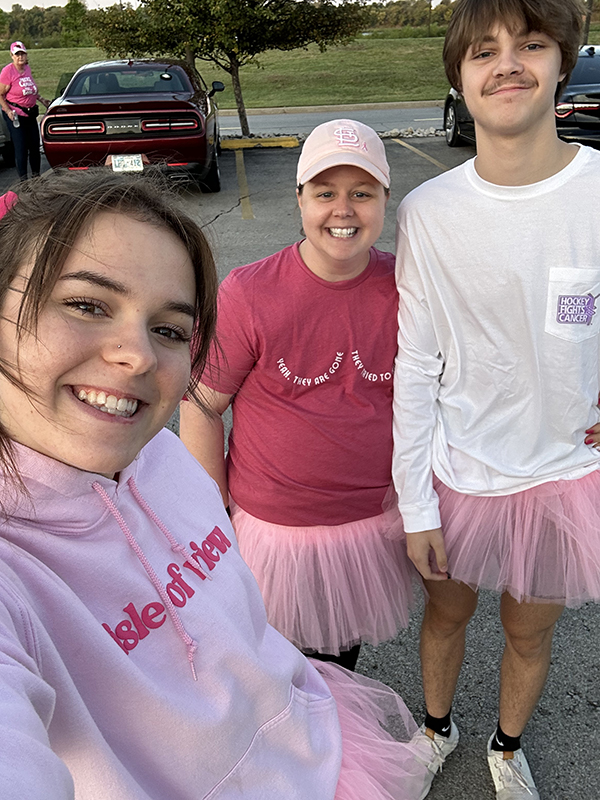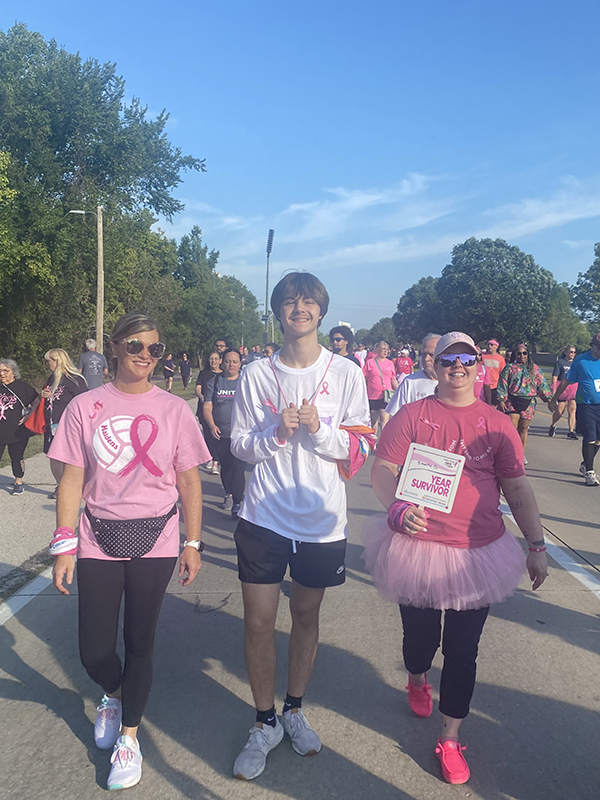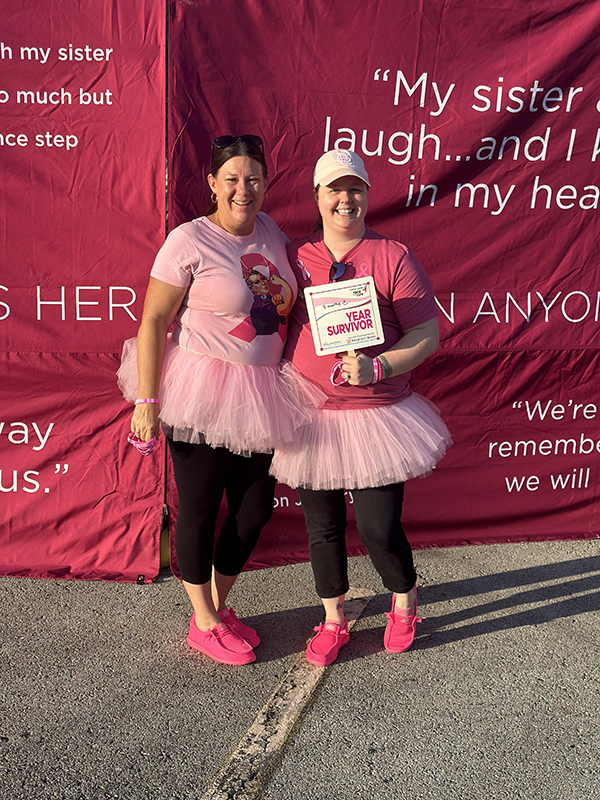Like many patient journeys, mine started with a lump.
I first felt it in my breast in June of 2022, but when I had my ob-gyn check it, he wasn’t too concerned.
“Probably just a cyst,” he told me.
But at a follow-up appointment three months later, he felt differently. He told me to go get a mammogram, suspecting what I had, of course, feared: cancer.
As a Content Director at Annexus Health, cancer is never far from my mind. I’m part of a team that delivers provider-centric, patient-forward solutions that help ensure patients facing cancer and other diseases receive the financial assistance and services they qualify for to afford and access the care they need. I think I can speak for everyone at Annexus Health when I say we take cancer personally. Still, the word hits more than a little differently when it’s your own health being discussed.
I knew that from previous experience. I was already a cancer survivor, having undergone surgery for thyroid cancer in 2019. Now, it looked like I might have to face cancer all over again.
Navigating the cancer patient journey can be overwhelming, and unfortunately, many of us will have to do it at some point: according to data from the American Cancer Society, about 40% of Americans will develop cancer during their lifetime.1
A silver lining in this statistic (when you’re dealing with cancer, you look for silver linings wherever you can find them!) is that we don’t have to do it alone. We can look to others who have been there—as patients or as caregivers—for guidance, support, or sometimes just a listening ear.
Talking with the people around me who have gone through similar experiences has been a real source of help and comfort. That’s why I wanted to share my story here—the lessons I have taken from my experience with cancer. I’m not a doctor and I certainly can’t give medical advice, but my hope is that if you’re on your own patient journey right now, these tips might come in handy. At the very least, you can take a little comfort in this reminder that you’re not alone.
1. Prioritize your health
After my doctor recommended I get a mammogram, I put it off for three whole months. Life just kept getting in the way, but when I finally got one in December, my lump was assessed as a BI-RADS 5, indicating a high likelihood of malignancy. I had an ultrasound-guided biopsy two days later but, unfortunately, had to wait until after my doctor’s Christmas break to get my results.
I had to wait for the official diagnosis to confirm what I already knew. I was having pain, as well as peau d’orange, a change in skin texture that resembles an orange peel. I knew it was cancer, and I was right.
The biopsy results showed I had invasive ductal carcinoma, a common and fast-growing form of breast cancer. The earlier you can catch it and treat it, the better the prognosis. While I couldn’t get back those three months I had put off the mammogram, I did schedule an appointment right away with the breast specialist my ob-gyn referred me to.
2. Advocate for yourself
Unfortunately, when I met with my breast specialist, I noticed several red flags.
For one thing, his office labeled my lab sample for genetic testing with the wrong name. When I pointed out this error, they brushed it off like it was no big deal. But making sure a lab sample was labeled for the right patient sure seemed like a pretty big deal to me!
For another, the doctor quickly dismissed my concerns about cost of care when I brought it up. While it turned out I was lucky in that my insurance ultimately covered my care, the lack of information I received about treatment cost and available assistance led to a lot of unnecessary stress when I was already under enough stress as it was. I really wish someone at his office would have at least had a conversation with me about cost and looked for any financial assistance options I may have qualified for.
But the biggest red flag was that the doctor recommended against a double mastectomy, instead outlining a treatment plan that included a lumpectomy with chemotherapy and radiation. Everyone I knew of who had had this type of cancer had had a double mastectomy. I know that what’s right for one patient may not necessarily be right for another, but I didn’t understand my doctor’s rationale for this choice.
None of this sat right with me, so I decided to get a second opinion. A coworker and wonderful friend, Tara Megee, helped me find a great doctor. I met with this new breast specialist on a Monday, and by the end of the week, I went in for a double mastectomy. The surgery removed all of the cancer, so I didn’t have to undergo radiation. Moreover, oncotype testing revealed that my cancer would not have responded to chemotherapy—my original doctor’s plan. I’m so grateful I followed my instincts and got that second opinion.
3. Listen to your body
While the double mastectomy was successful, my recovery has been far from easy. In February, nearly three weeks after my surgery, I started feeling really tired and out of it. I figured I just had the flu. But when my smartwatch showed my heart rate was an alarming 160 bpm, I decided to call the doctor.
The doctor told me to go to urgent care, suspecting I had a blood clot. When I got there, they told me I was in critical condition and needed to get to a hospital. It turned out I was in septic shock resulting from an infection in the breast expander that had been placed during my mastectomy in preparation for a planned DIEP flap breast reconstruction surgery.
Had I ignored that sick feeling and racing heart, I could have died. Fortunately, I got into emergency surgery and on antibiotics in time to save my life.
4. Embrace your support system
For me, having a strong support system has been the key to coping with cancer and the complications from my mastectomy. My amazing husband takes me to all my appointments and even washed my hair for me when I couldn’t do it during my recovery. My two wonderful sons have been so thoughtful and caring. My whole family has been there to help with everything I’ve needed every step of the way, even when what I need is just someone to sit and watch TV with me to help take my mind off of everything.
My Annexus Health family has been there for me as well. I remember my doctor asking me if I had told my company about the cancer, because a lot of patients don’t tell their employers. That was really eye-opening for me as to how lucky I am to work at Annexus Health. I never thought twice about telling my team what I was going through. Everyone here—even the company’s co-founders, Joe Baffone and Brad Frazier—has been incredibly supportive. My boss at the time, our CFO John Lemkey, checked in on me daily with jokes and words of encouragement. He even had his kiddos send me a “You got this!” video that really brightened my day.
Since sharing my diagnosis, I’ve been truly touched to receive an outpouring of love and kindness from every corner of my life. So much of what cancer brings is negative, but it has also highlighted the good in the many people around me.
5. Treat everyone with compassion
With the double mastectomy behind me, I’m starting to heal both physically and emotionally. To those around me, it might seem like I’m back to normal, but healing doesn’t happen overnight. I’m now on adjuvant therapy—a daily medication I’ll take for the next seven to ten years to reduce the chance of the cancer coming back by destroying any remaining cancer cells. And mentally, I’m still processing everything that happened to me and mourning who I was before cancer, even as I get back into the daily routines of life.
I’ve always considered myself a compassionate person, but going through cancer has made me even more so. It’s made me realize that, as we go about our days, we’re all dealing with something—whether it be health issues, financial issues, emotional issues, or something else. We can’t always see what someone else is going through, so the best approach is to always be kind and understanding toward everyone in our lives. Odds are, they need it.
Thanks for reading. Take care.
Susan G. Komen Race for the Cure in Tulsa, OK, on September 23, 2023



Reference: 1. Cancer Facts & Figures 2023. Atlanta: American Cancer Society; 2023. https://www.cancer.org/content/dam/cancer-org/research/cancer-facts-and-statistics/annual-cancer-facts-and-figures/2023/2023-cancer-facts-and-figures.pdf


